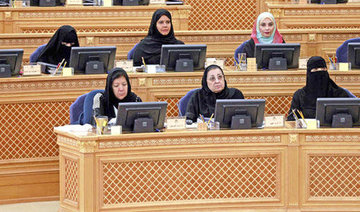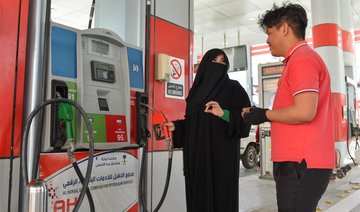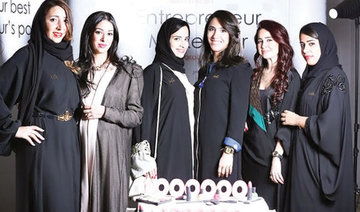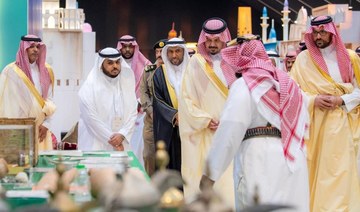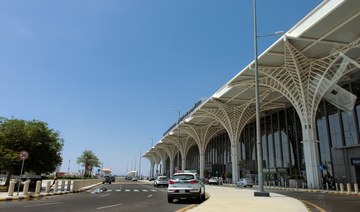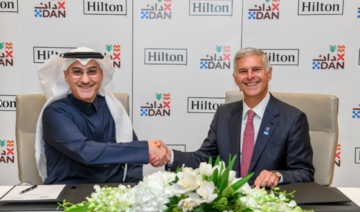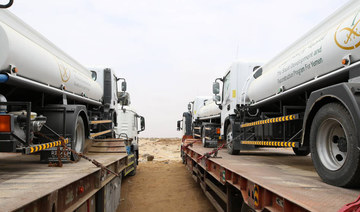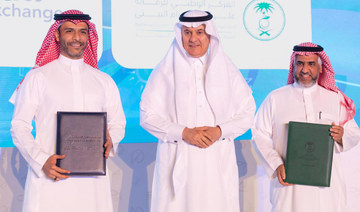JEDDAH: Often classified as oppressed, persecuted and crushed by the ultra-conservative, male-dominant society, Saudi women must take a stand against the misconceptions and false stereotypes many have of them.
Times have changed in the Kingdom, and Saudi women are gaining more and more rights — something much of the world is still ignorant about.
Many people around the world have been fed wrong ideas about Saudi Arabia’s 32 million population, of which nearly half are women, according to a Step Feed report citing the Saudi General Authority for Statistics.
Women in the Kingdom can and do open their own bank accounts without the need for a male guardian’s permission, contrary to several false reports by renowned media outlets.
Women do have the authority over their own bodies and health as elective surgeries or medical treatments can be freely sought without permission from a male guardian.
“The Law of Practicing Healthcare Professions in Saudi Arabia states in article 19 that the competent patient has the right to decide on the surgery, it means that it applies for both genders,” Dima Talal Al-Sharif, a lawyer at the Law Firm of Majed Garoub in Jeddah, told Arab News.
Since the historical royal decree on September 26 last year allowing women to drive, obtaining a driver’s license does not require a guardian’s consent. “Saudi women are allowed to get a driver's license without permission from a legal guardian,” said Al-Sharif.
Since 2006, Saudi women have been able to apply for their own personal identification cards too, she added.
“As per the King’s instructions, Saudi women will be allowed to issue and renew their own passports without the guardian's permission very soon, in addition to studying abroad and traveling without their guardian's permission,” according to Al-Sharif.
“Some Saudi families allow their daughters to travel abroad without a male companion, be it for tourism or treatment,” said Riham Al-Saadi, 27, a Saudi national who has traveled to several countries without her male guardians. Al-Sharif agreed, saying that some Saudi families allow their daughters to travel alone through the electronic travel permission.
Saudi female lawyers can also plead in Saudi courtrooms, a change that came about after 2013 when the first female trainee advocate was registered, achieving a significant victory for women who were subsequently allowed to practice as lawyers.
Jeddah-based attorney Bayan Zahran became the first Saudi woman to open a law firm in January 2014.
Al-Sharif also pointed out that women have the right to issue a power of attorney by themselves.
Women are also allowed to start their own businesses without the need for a male guardian’s permission, be it a husband, father, brother or even son, explained the lawyer citing the Ministry of Commerce and Investment.
As for renting apartments and cars, Al-Sharif said, “King Salman ordered all women’s procedures to be facilitated since having their own national ID. So she has the right to rent an apartment or even a car. However, most rental offices ignore this and never apply it and require a male guardian’s [permission].”
Applying for a job is another basic right that Saudi women enjoy without the interference of a male guardian.
Claiming that women cannot mix with the opposite gender is not entirely true. While it applies in some workplaces, men and women do interact in public place like malls, restaurants and universities, where female students in Saudi universities have male instructors in classes.
Saudi courts sometimes also grant mothers custody of their children in cases where the father is found ineligible, Al-Sharif added.
Wearing a full-length black abaya is not mandatory in the country either. Women still can wear colorful robes without headscarves in some big cities like Jeddah and Riyadh. Medicine students and nurses publicly move around the hospital grounds wearing a white lab coat.
Al-Saadi said one of the biggest misconceptions she has heard about Saudi women is that they are not allowed to leave the house and they only “cook and obey men”.
“This is very wrong. Thankfully, we are living our lives to the fullest, and all these wrong ideas about us do not exist on the ground.”
A documentary about women in Saudi Arabia would be a good way to educate people, she suggested. “A documentary that shows our lives, how we are happily living. I think this is the fastest way to correct the misconceptions about us.”
Al-Sharif, the lawyer, believes that some of the misconceptions come from women's own lack of awareness of their rights.
In July 2016, an app called “Know Your Rights” was launched by Saudi lawyer Nasreen Alissa, to help spread awareness among her peers.The media plays a major role in marketing inaccurate information and claims too, said Al-Sharif.
“The solution to raise women’s awareness of their rights can be the media itself, through the proper coverage of women's empowerment and the correction of the inaccurate information.”
Her advice to Saudi women is to be more vocal about their rights.
“As a Saudi woman, it’s your turn now to look for rights and to make sure that such rights are known and applied.”
Time for Saudi women to be more vocal about their rights
Time for Saudi women to be more vocal about their rights
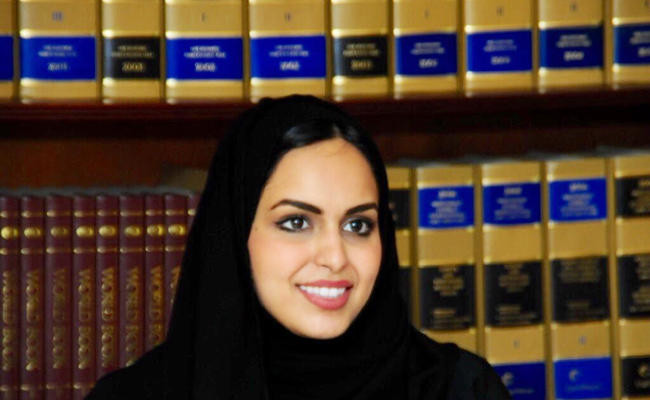
Madinah megaproject aims to make region a hub for wellness tourism

- Facility will cover 240,000 square meters and aims to establish Madinah as a global destination for health and wellness
- Once built, center hopes to accommodate up to 30 million visitors a year by 2030
RIYADH: Almqr Development Co., the investment arm of Madinah Regional Municipality, has signed an agreement with a national construction company to build a wellness resort and rehabilitation center, the Saudi Press Agency reported.
Forming part of the “Heart of Uhud” project north of the Prophet’s Mosque, the facility will cover 240,000 square meters and aims to establish Madinah as a global destination for health and wellness.
Once built, with the support of local and international investors, the center hopes to accommodate up to 30 million visitors a year by 2030.
Mulberries — the superfood coloring Al-Ahsa’s markets

- Small red and black fruits are highly prized, not just for their delicious taste but for the health benefits they bring
- Season is brief, starting after the chill of winter and lasting around a month
RIYADH: Mulberry season has arrived, adding a bright splash of color to the fruit and vegetable markets in Al-Ahsa governorate.
The small red and black fruits are highly prized, not just for their delicious taste but for the health benefits they bring.
Their season is brief, starting after the chill of winter and lasting around a month. The current harvest is red, but the berries can also be blue or purple. They are sweet when fully mature and have a tart flavor during the earlier stages.
Mulberries enjoy a devoted following among farmers and consumers alike. Prices fluctuate depending on ripeness and size, ranging from SR5 ($1.33) to SR15 ($4) per half kilo, Saudi Press Agency reported.
They are a popular ingredient in cakes and ice cream, or as a decoration for various foods. The juice is enjoyed by many and the berries can be frozen for later consumption.
Dr. Hossam Al-Din Hussein Mahmoud, a professor of fruit science at King Faisal University in Al-Ahsa, said various types of mulberries were grown in the region including red, Iranian, Kashmiri and American.
He also talked about ongoing research at the university’s College of Agriculture and Food Sciences, which aims to document all strains and varieties of fruit found in Al-Ahsa, and discussed the health benefits associated with mulberries.
Classed as a superfood, they are rich in antioxidants, dietary fiber, vitamins and minerals. They are also believed to contribute to healthy blood sugar levels and reduce the risk of Type 2 diabetes. Their high anthocyanin content means they have anti-inflammatory properties, which can lower the risk of some diseases and enhance the immune and digestive systems.
Consumption of mulberries is also linked to a reduced risk of cardiovascular disease risk, lower blood cholesterol, better skin health and heart rate regulation.
Saudi development program teams up with Selah Foundation for water project in Yemen

- The initiative, in Hadhramaut region, will install solar power stations to provide the energy required to improve the availability and supply of water to 1.7 million people
- The Saudi Development and Reconstruction Program for Yemen has more than 229 active projects in 8 sectors, including education, health, water, transportation and agriculture
RIYADH: The Saudi Development and Reconstruction Program for Yemen and the Selah Foundation for Development agreed on Wednesday to cooperate on a renewable-energy water-security project in Yemen’s Hadhramaut region, which they said will benefit about 1.7 million people.
The deal was signed by Hassan Al-Attas, the assistant general supervisor of the development program, and Ali Hassan Bashmakh, the foundation’s executive director.
The governor of Hadhramout, Mabkhoot bin Mubarak bin Madhi, attended the signing ceremony and thanked Saudi authorities for the assistance provided to Yemen through the development program. He also expressed gratitude to King Salman, Crown Prince Mohammed bin Salman and the employees of the program for their contributions.
Al-Attas said his organization has more than 229 active development projects in Yemen, helping to improve the lives and livelihoods of people across the country. They span eight sectors, including education, health, water, transportation and agriculture.
As part of the project in Hadhramaut, solar power stations will be established in nine areas to provide the energy required to improve the availability and supply of water. Training and capacity building will also be provided to ensure local technicians can operate and maintain the solar equipment.
The development program and the foundation previously partnered with the Arab Gulf Program for Development on other renewable-energy projects to help improve the quality of life of an estimated 62,000 people in five of Yemen’s governorates. And in January, the two organizations launched a water-security project that aims to benefit about 800,000 people in Aden. On the Yemeni island of Socotra, the development program’s projects help meet about 50 percent of water needs, 100 percent in Al-Ghaydah, and 10 percent in Aden.
The Selah Foundation for Development received the Prince Talal International Prize for Human Development in 2020 for its continual efforts to enhance water security.
Other officials who attended the signing ceremony on Wednesday included Yemen’s planning and international cooperation minister, Waed Badheeb; the minister of water and environment, Tawfiq Abdulwahed Al-Sharjabi; and Mohammed Al-Jaber, supervisor general of the Saudi Development and Reconstruction Program for Yemen.
Saudi FM receives Salvadoran counterpart in Riyadh

- During the reception, the ministers reviewed relations between the Kingdom and El Salvador and opportunities to enhance cooperation
RIYADH: Saudi Foreign Minister Prince Faisal bin Farhan received his Salvadoran counterpart Alexandra Hill Tinoco in Riyadh on Wednesday.
During the reception, the ministers reviewed relations between the Kingdom and El Salvador and opportunities to enhance cooperation between the two countries in all fields.
Various topics of common interest were also discussed during the meeting.
Saudi center launches pavilion for children during Environment Week
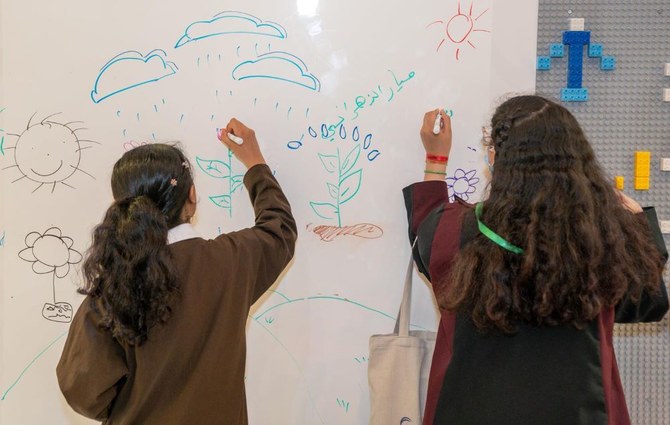
- NCEC’s pavilion, in Riyadh’s Granada Square, carries the slogan Know Your Environment
- It features activities for children promoting environmental preservation and protecting air, water and soil from pollution
RIYADH: The National Center for Environmental Compliance (NCEC) is hosting an interactive pavilion for children to mark Environment Week 2024, which began last Sunday, the Saudi Press Agency reported.
The center’s pavilion, in Riyadh’s Granada Square, carries the slogan “Know Your Environment.” It features activities for children promoting environmental preservation and protecting air, water and soil from pollution.
Young visitors are first met with a moving knowledge wall containing several tips placed on hanging cubes, each decorated with a color and information, or a picture.
Children can then move to the memory board to register as honorary members charged with protecting the environment. A part of the pavilion is dedicated to rest and entertainment, including cube puzzles and other games.
The center offers specialized scientific workshops for adults during Environment Week, addressing topics including land degradation.
The Kingdom is set to host COP16 in December this year, enhancing cooperation between the 197 signatory countries of the UN Convention to Combat Desertification, and searching for ways rehabilitate millions of hectares of degraded land.
The center’s presence in Riyadh, Jeddah, Alkhobar and Taif aims to boost community awareness of environmental issues through a range of activities and events.


